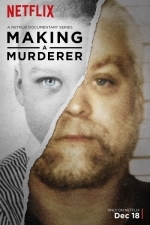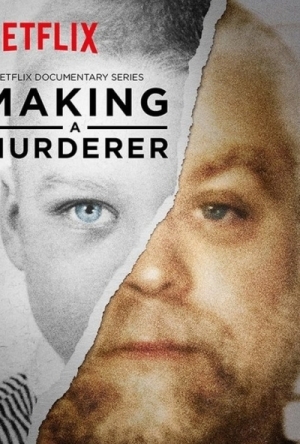Search
Entertainment Editor (1988 KP) created a video about Making A Murderer - Season 2 in TV
Oct 22, 2017

Making A Murderer - Season 2
TV Season Watch
Making A Murderer directors Laura Ricciardi and Moira Demos are currently in production of six new...
True crime crime documentary
Kirk Bage (1775 KP) rated Making A Murderer - Season 1 in TV
Mar 3, 2020
The phenomenon of “true crime” as entertainment is disturbing. What we are saying when we subscribe to watch these compellingly morbid shows is that, of course, we don’t “enjoy” or condone the crimes themselves. But, we do increasingly expect that without the grotesque detail of primary crime scene evidence, documented visually, we can switch over to another show that will give us our macabre kick. So, it is a dangerous precedent to say that without that factor we won’t engage.
What does make us want to know, and solve, and understand the worst criminal minds of the last century? Do we place ourselves as amateur sleuths and psychologists, so we can have our own opinions on a difficult subject, or do we just want to see the very worst of humanity to satisfy a need to be shocked? One thing for sure is that there is no end to this kind of docu-drama available, especially on Netflix, if we choose to stomach it.
I watched three recently in quick succession, and do feel like I have something to say about it…
First, was the extension of the Making A Murderer case of Steven Avery, which can be credited for re-imagining the scope of this kind of “reality” show on Netflix in late 2015. Without a doubt, the draw of the first series was in showing how corrupt, ambiguous and vague the American criminal system can be. We know this from circus shows such as the OJ Simpson case, that capture a curiosity in the public that must be explored and documented. There is no point in saying, no don’t do it, because eventually we have to know, and current forensic science and film techniques allow us to approach it. Carefully. Oh, so carefully!
In this case, the much criticised production extracts further detail from an undeniably fascinating case of criminal negligence and injustice, without ever providing a new revelation enough to definitively say we now know enough to put it to bed. It focuses largely on the power of Kathleen Zellner as a lawyer of impeccable motives and results to prove the innocence of convicted men.
What we then get is 10 episodes of contrivance that increasingly try to convince us further that this is a miscarriage of justice that must be addressed. The continual message is that there is a conspiracy here, which makes for good TV. Someone doesn’t want this show to have an influence. Who is covering up what? And why is the justice system adamant in disallowing the revelations this show throws up so regularly? In the end it becomes less about the victim and the crime, as an indictment of a process that does not want to be examined. The power of this show has always been that something is rotten in Denmark. But what exactly?
There is no doubt at all that once involved you have to keep watching. It is exceptionally presented, and therefore successful as an entertainment because of that. The complexity of the argument comes not in the real recordings of conversations and evidence, but in the form of presentation as a TV show. A question, I am certain, the film-makers themselves constantly ask. It is about finding “truth” for the families of the victims; a crusade that may or may not include individuals wrongly accused of a crime.
What does make us want to know, and solve, and understand the worst criminal minds of the last century? Do we place ourselves as amateur sleuths and psychologists, so we can have our own opinions on a difficult subject, or do we just want to see the very worst of humanity to satisfy a need to be shocked? One thing for sure is that there is no end to this kind of docu-drama available, especially on Netflix, if we choose to stomach it.
I watched three recently in quick succession, and do feel like I have something to say about it…
First, was the extension of the Making A Murderer case of Steven Avery, which can be credited for re-imagining the scope of this kind of “reality” show on Netflix in late 2015. Without a doubt, the draw of the first series was in showing how corrupt, ambiguous and vague the American criminal system can be. We know this from circus shows such as the OJ Simpson case, that capture a curiosity in the public that must be explored and documented. There is no point in saying, no don’t do it, because eventually we have to know, and current forensic science and film techniques allow us to approach it. Carefully. Oh, so carefully!
In this case, the much criticised production extracts further detail from an undeniably fascinating case of criminal negligence and injustice, without ever providing a new revelation enough to definitively say we now know enough to put it to bed. It focuses largely on the power of Kathleen Zellner as a lawyer of impeccable motives and results to prove the innocence of convicted men.
What we then get is 10 episodes of contrivance that increasingly try to convince us further that this is a miscarriage of justice that must be addressed. The continual message is that there is a conspiracy here, which makes for good TV. Someone doesn’t want this show to have an influence. Who is covering up what? And why is the justice system adamant in disallowing the revelations this show throws up so regularly? In the end it becomes less about the victim and the crime, as an indictment of a process that does not want to be examined. The power of this show has always been that something is rotten in Denmark. But what exactly?
There is no doubt at all that once involved you have to keep watching. It is exceptionally presented, and therefore successful as an entertainment because of that. The complexity of the argument comes not in the real recordings of conversations and evidence, but in the form of presentation as a TV show. A question, I am certain, the film-makers themselves constantly ask. It is about finding “truth” for the families of the victims; a crusade that may or may not include individuals wrongly accused of a crime.
